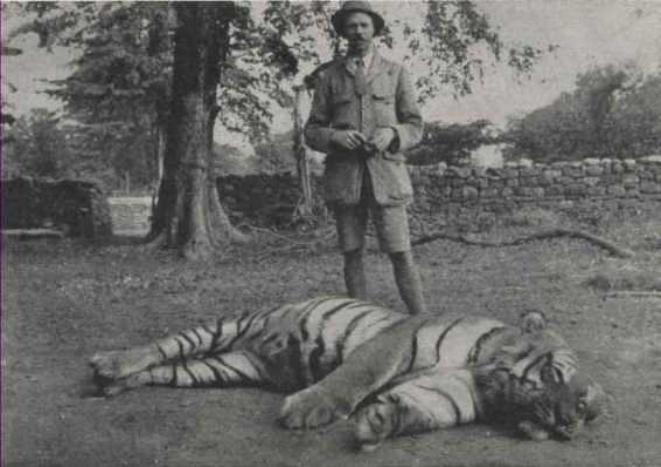by Lawrence Anthony
Last year I listed my top ten favorite books of fiction. A few changes may have happened since, but the top two books on my list are accounts of a pair of some of the most successful elephant hunters.
Commenter Vicomte wrote:
I take issue with your first two recommendations.
HUNTING ELEPHANTS?
Seriously,
that's just messed up. If you like reading about that kind of crap,
then you must be an awful person. Your obviously not aware of that
elephants are kind, gentle creatures, and are very intelligent.
Elephants have been known to cry and burry(sic) their dead loved ones. They
even burry(sic) people that they find and think are dead. Sometimes they make
a mistake and burry(sic) a person that is lost and has fellen(sic) asleep, but
that's not there fault we're all human after all.
So if you want
to go and read this garbage then I hope you enjoy being by yourself
because thats(sic) where you'll be up in your IVORY tower because no one
wnats(sic) to be with a jerk that murders animals because their sick and
twisted.
If you want to read a good book about elephants by a
decent and caring human being that truly appreciates the majesty of
these beautiful creatures, I reccommend(sic) The Elephant Whisperer by
Lawrence Anthony.
Firstly, I'd like to point out that some people are just no fun at all.
Secondly, am I being rude, or grammatically correct, in noting his, or her, spelling errors?
But the purpose of this post is to be about the book recommended in his, or her, comment.
To give you an idea of how far behind in my reading list I am, let me point out that I had not planned on reading this book, perhaps just reading a few Amazon reviews of it. And so when the book was recommended I added it to my Amazon.com "wish list." Then, last Christmas, my mother was insistent on asking me what I wanted for the holiday. "Nothing," was not the correct answer, apparently. So I directed her to my wish list and forgot about the book I was going to read reviews about eventually. (Fascinating story, huh?)
So here we are with my new book, and I started reading it.
The book is about a guy who bought a game farm in South Africa. He and his French wife ran (run?) it to show off the animals to tourists.
The author starts by talking about poachers killing animals in his preserve, their selling of the meat, and his attempts to stop them. And so on, and so forth...
One day he receives a phone call asking him if he wants a small herd of elephants (seven, as it turns out). He says, "yes," and spends a few chapters talking about his preparations for fencing them in and their transportation, etc.
I've only read a few chapters past this point but I have enough to tell you that Vicomte's idea of elephants being wonderful isn't as rosy a picture as he, and the author of the book would like us to believe.
The author and his wife (did I mention that she is French? The author is very proud of this fact.) seem to enjoy living amongst the animals of Africa, and he paints a mostly rosy picture of their park and the animals.
But if you merely read the book, you'll notice that not everything is as nice as he leads us to believe. He tells one story about his dog being harassed by some monkeys. And one day his dog kills one. After he pulls the dog away the monkeys silently collect their dead troop member and carried him away. "I have no idea what they did with the body," he ends the story with. He leads to that line by pointing out how wonderful nature and the animals are.
Note an excerpt from Vicomte's comment:
Elephants have been known to cry and burry(sic) their dead loved ones.
If you read this story you'd be led to believe the monkeys took their family member always, had a funeral, and buried him with respect...
That's what our author and Vicomte seem to think. I like their thoughts on the subject. They make you feel all warm and fuzzy inside.
Would you like to know what the monkeys almost certainly did, in reality? They took their dead family member away, away from the dangerous dog, and...ate him. You can't just go around leaving good meat to waste.
And that's much the story throughout as much of the book as I've read so far. If you stretch you mind enough... and believe hard enough... you to can enjoy the wonderfulness of the world like Vicomte does.
I like the optimism and joy of that thinking, but to think that way you need to ignore reality.
The reason the relocated elephants need to be fenced in is because when they are not, they kill people and destroy homes and food. "Conservation's Chernobyl," is how the book's author described what would happen if his elephants got out, again.
One more story from the book to more fully illustrate my point: The elephants are kept inside of an electrified fence. They prefer to not touch it. During one escape attempt the elephants pushed their least liked kin into the fence and tried to force him through it so that they would not get shocked. That elephant wasn't pleased with the situation.
I like the pleasantness, too much is mean these days, but that pleasantness isn't reality.
I'm not sure if I'll finish this book,
The Odyssey is calling me.
Incidentally, have you heard about the elephants killing rhinos for fun?




